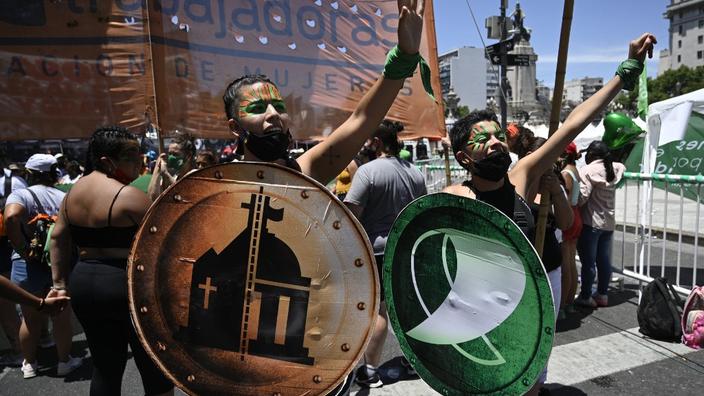A law on the legalization of abortion in Argentina, debated Thursday, December 10 in the National Assembly, should be approved by the deputies on Friday, before going to the Senate, two years after the failure of a similar initiative.
In this country of 45 million predominantly Catholic inhabitants - birthplace of Pope Francis - abortion is only legal in cases of rape or danger to the mother's life, according to a law in force since the 1920s .
Read also: In Poland, the abortion battle resumes
The president of the Chamber of Deputies, Sergio Massa, estimated that the text, which raised passionate debates, would be put to the vote of the deputies on Friday at 6 am (10 am in Paris).
Debated for ten days in committee and amended, the bill initiated by center-left president Alberto Fernandez authorizes voluntary termination of pregnancy (abortion) until the 14th week.
For it to be adopted, a majority of 129 votes is required out of the 257 seats in the Assembly.
The party in power and its allies seem to gather enough forces in favor of the text, but it is in front of the upper house, where an alliance of center-left and Peronist right has a large majority, that will be decided before the end. of the year this question which strongly divides Argentinian society.
Massed in front of the parliament, pro-abortion demonstrators, wearing a green scarf, symbol of their struggle, carried signs on which one could read in particular:
"Legal abortion, now, free and in hospital!"
.
Among them, Valeria Bonetto, a 48-year-old doctor, believes that
"it is a question of public health, social justice and human rights".
On the other side of the barriers, opponents of the law displayed dolls representing bloody babies.
One of their banners proclaimed:
"Every life is worth it"
.
3,000 women died of illegal abortions
During the first ten hours of debate, 86 lawmakers out of 164 registered speakers took part.
The deputy of the government party Ana Carolina Gaillard estimated that
"the debate is not for or against abortion but for an abortion with or without health and safety conditions"
, referring to the 3,000 women who have died since 1983 as a result of clandestine abortions , figure made public by President Fernandez.
When announcing the tabling of his bill in mid-November, the Peronist president declared that
“the criminalization of abortion has served no purpose.
Each year some 38,000 women are hospitalized for complications from clandestine abortions ”
.
According to the government, between 370,000 and 520,000 clandestine abortions are performed each year in the country.
Opposition MP Martin Maquieyra (right) called on him to
"choose the difficult path of sex education and contraception"
.
“We need a state that accompanies but does not reject.
What would Argentina look like if we had to choose who should be born or not? ”
, he said.
Read also: Extension of the legal deadline for abortion: the ethics committee critical but not opposed
In 2018, deputies voted for the law authorizing abortion before the Senate rejected it a few days later.
Under the mandate of the former center-right president Mauricio Macri (2015-2019), the historic vote in the Assembly brought together 129 deputies for the legalization of abortion, against 125 and one abstention.
In the upper house, 38 senators were then opposed to the text, against 31 for and two abstentions.
This is the ninth time that a bill on abortion has been tabled in parliament, but it is the first time that the initiative has come from the executive.
The text authorizes abortion
“until the 14th week of pregnancy”
and provides for a
“conscientious objection”
for health professionals refusing to perform it, but obliges them to
“refer the patient to
appropriate
care”
.
At the same time, a
"thousand days plan"
also intends to
"strengthen access to care during pregnancy and during the first years of a child's life"
for families in a situation of financial vulnerability.
A pioneer for the promulgation of laws on same-sex marriage and gender identity in Latin America, Argentina could, if the text is adopted by parliament, join Cuba, Uruguay, Guyana and the province of Mexico, the only ones to authorize abortion without conditions in the region.

